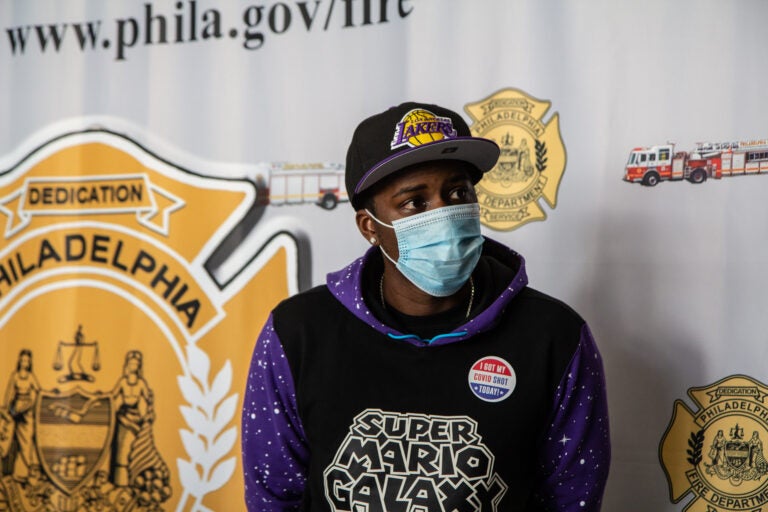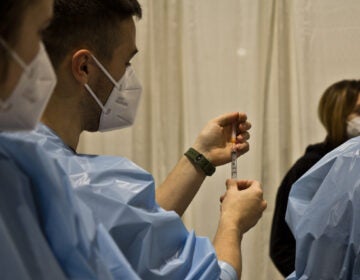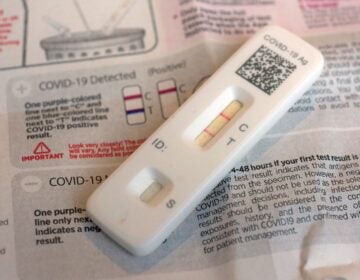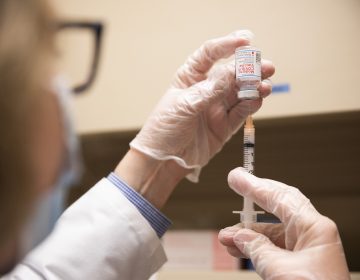Pa. coronavirus update: Philadelphia announces next vaccine priority groups
Philadelphia’s priority groupings, unlike federal or state guidance, prioritizes people under the age of 74 with high-risk medical conditions. Here’s why.

Eric Crawford, EMT for Engine 46, received the first dose of the Moderna COVID-19 vaccine at Philadelphia Fire Department headquarters on Jan. 6, 2021. (Kimberly Paynter/WHYY)
Ask us about COVID-19: What questions do you have about the current surge?
Pennsylvania officials announced 7,275 new confirmed cases of COVID-19 on Tuesday, bringing the state-wide total since the start of the pandemic to 733,429. As of 11:59 p.m. Monday, the state recorded 227 new deaths from COVID-19, bringing the total fatality count to 18,080.
There are 5,232 people currently hospitalized due to COVID-19, near double the peak in the spring. Of those patients, 1,070 are in the intensive care unit. The statewide percent positivity rate — the number of people tested with positive results — is currently 14.4% statewide.
Philadelphia reported 637 additional confirmed cases on Tuesday, for a total of 98,215 since the beginning of the pandemic. The city’s Department of Public Health confirmed 37 additional fatalities Tuesday, which brings the total number of deaths attributable to the virus in Philadelphia to 2,640.
Pa. provides update on contact tracing, testing efforts
With substantial COVID-19 transmission rates in all 67 counties, the Pennsylvania Department of Health today shared its weekly update on Pennsylvania’s case investigation and contact tracing efforts, and again encouraged Pennsylvanians to download the COVID Alert PA app in order to help the commonwealth track cases.
“For [those] who receive a positive COVID-19 test, please remember to answer the call and for all others, please remain alert in case you are identified as a close contact and a contact tracer needs to reach you,” Secretary of Health Dr. Rachel Levine said Tuesday. “We must continue to do the right thing in order to mitigate the spread of this virus.”
If a Pennsylvania resident does not answer contact tracer or case investigators’ initial call to start the case investigation, the Department of Health leaves voicemails, texts, and sends a letter to the home requesting a callback. In the past week, 9 percent of cases reported — more than 4500 people — were successfully contacted by a public health professional statewide.
From December 27 to January 2, there were 1,528 contact tracing staff working with local and county health entities, partner organizations and the Regional Response Health Collaboration Program within the Department of Human Services, as well as volunteers from Co-County Wellness in Berks County and Penn Medicine Lancaster General Health. These staff monitored, in total, 5,862 contacts identified during the case investigations.
Since the implementation of the Contact Tracing Management System in early October, 56,300 of 73,800 contacts, or 76 percent of the total contacts identified, have been reached to communicate their quarantine status and offer ongoing symptom monitoring, the department reported.
State Director of Testing and Contact Tracing Michael Huff provided an update on testing later Tuesday, saying that to date, nearly 9 million test results have been received in Pennsylvania.
The department continues to offer mobile test sites in five different counties each week. Last week, the regional testing sites were located in Crawford, Dauphin, Lehigh, Somerset and Union counties, and tested approximately 6,700 individuals. This week, the regional testing sites are in Bradford, Clarion, Fulton, Lancaster, and Pike counties, and will conclude Saturday.
Philadelphia announces next vaccine priority groups
The first phase of Philadelphia’s vaccine rollout continues, with frontline health care workers and long-term care facility residents and staff at the top of the priority list. Within that phase, City Health Commissioner Tom Farley said Tuesday, the city has vaccinated 50,529 people with the first dose and 9,600 people with the second. And as of Tuesday, the city’s Department of Public Health has new details about who’s up next.
Following the current phase, 1A, phase 1B will include first responders, service providers working with high-risk populations, public transit workers, food handlers, childcare and education providers, high-volume essential retail workers, and those who manufacture critical goods. It will also include those at a high risk of morbidity or mortality from COVID-19, including people who live and work in congregate settings, people 75 and older, and immunocompromised people with certain high-risk medical conditions.
Phase 1C will include sanitation workers, maintenance/janitorial workers, utility workers, postal and package delivery workers, those who work in higher education, finance, transportation, construction, IT & telecommunications, public health, and legal professions— and people between the ages of 65 and 74. And in phase 2, the city will attempt to inoculate everyone else older than 16 years of age who did not previously receive the vaccine.
The city could begin vaccinating populations in phase 1B in late January, potentially the week of January 25.
This list of priority groups, which was developed using CDC guidance and input from the City’s Vaccine Advisory Committee, differs slightly from federal recommendations as well as Pennsylvania’s general state guidance: it prioritizes people under the age of 74 with high-risk medical conditions, placing them in phase 1B instead of phase 1C.
“That’s because these medical conditions are common in low-income populations and in minority populations — we have higher rates of them here in Philadelphia than elsewhere, it’s a more important risk factor here, and this is one way for us to address the racial disparity in COVID mortality here in Philadelphia,” Farley said Tuesday.
The vaccine will be made available at hospitals, occupational health clinics and through on-site vaccinations for congregate settings. Pharmacies, urgent care centers, and mass vaccination clinics like the one at the Convention Center last week, will also distribute the vaccine.
It’s still unclear, however, when each group can expect to be vaccinated. According to Farley, that’s because the federal government has not yet told the city how many doses they will receive after January. This week, Philadelphia received 9500 doses of the Moderna vaccine and 9750 of the Pfizer vaccine, and can expect similar shipment numbers for the rest of the month. Beyond that, they aren’t sure.
“It could be more, it could be less, it could be zero. We have absolutely no information,” he said Tuesday.
Philadelphia officials plan to lift business, activity restrictions
Starting Saturday, January 16, city officials will begin lifting restrictions on Philly businesses and activities. This follows a period of tightened COVID-19 restrictions, after holiday gatherings and activity prompted a winter surge in cases and threatened to overwhelm local hospitals.
Indoor dining will be allowed, with a cap on the number of diners set at 25 percent of the seating capacity. Theaters and performance spaces will be allowed, with mask requirements, no food or drink allowed, and a cap of 10 percent maximum occupancy. Colleges will be allowed to resume in-person classes.
Senior day services, indoor catered events, and all indoor social gatherings that could merge households — including in the home — are still not allowed under the city’s COVID-19 restrictions.
If necessary, the city may reinstitute restrictions if case rates rise and officials believe the spread is connected to reopened business and activities, Farley added. He encouraged Philadelphians to continue washing hands, wearing masks, and physically distancing whenever possible, saying that “the vaccine, as much as it’s good that it’s here, will not help us get through the winter wave.”

Get daily updates from WHYY News!
WHYY is your source for fact-based, in-depth journalism and information. As a nonprofit organization, we rely on financial support from readers like you. Please give today.



![CoronavirusPandemic_1024x512[1]](https://whyy.org/wp-content/uploads/2020/03/CoronavirusPandemic_1024x5121-300x150.jpg)




